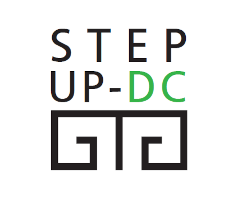SESSION 7C, RELIGIOUS EDUCATION - 2 - Teaching Religious Education in Primary and Secondary Education
STEPUP-DC Project

Course DescriptionBasic Topics
- Teaching religions through dialogue, by playing and workshops with activities
- Plan RE lessons by using RFCDC
Objectives
- To enable students to recognise opportunities for implementation of EDC/HRE pedagogies in Religious Education.
- To offer students an overview and support them in developing a critical understanding of potential challenges in the implementation of EDC/HRE in Religious Education.
Learning outcomes
- To recognise opportunities to use democratic pedagogies and teaching methods in Religious Education in Primary and Secondary schools.
- To be able to plan lessons with activities based on experiential and inquiry teaching methodology.
Outcomes and CDC
- Knowledge and critical understanding
- Knowledge and critical understanding of language and communication
-
1907 - Can reflect critically on how diverse audiences may perceive different meanings from the same information (intermediate)
- Knowledge and critical understanding of culture, cultures, religions
- 2020 - Can describe the commonalities and differences which exist between different religious traditions (basic / intermediate)
- Values
- Valuing cultural diversity
- 202 - Promotes the view that one should always strive for mutual understanding and meaningful dialogue between people and groups who are perceived to be “different” from one another (basic)
- Attitudes
- Respect
- 503 - Expresses respect for different opinions, world views and ways of life unless they violate human rights (basic)
- 511 - Expresses respect for religious differences (advanced)
- Self-efficacy
- 802 - Expresses the belief that he/she can carry out activities that he/she has planned (basic)
- Skills
- Autonomous learning skills
- 1001 - Shows ability to identify resources for learning (e.g. people, books, internet (basic)
- 1003 - Accomplishes learning tasks independently (basic)
- Teaching religions through dialogue, by playing and workshops with activities
- Plan RE lessons by using RFCDC
- To enable students to recognise opportunities for implementation of EDC/HRE pedagogies in Religious Education.
- To offer students an overview and support them in developing a critical understanding of potential challenges in the implementation of EDC/HRE in Religious Education.
- To recognise opportunities to use democratic pedagogies and teaching methods in Religious Education in Primary and Secondary schools.
- To be able to plan lessons with activities based on experiential and inquiry teaching methodology.
- Knowledge and critical understanding
- Knowledge and critical understanding of language and communication
-
1907 - Can reflect critically on how diverse audiences may perceive different meanings from the same information (intermediate)
-
- Knowledge and critical understanding of culture, cultures, religions
- 2020 - Can describe the commonalities and differences which exist between different religious traditions (basic / intermediate)
- 2020 - Can describe the commonalities and differences which exist between different religious traditions (basic / intermediate)
- Knowledge and critical understanding of language and communication
- Values
- Valuing cultural diversity
- 202 - Promotes the view that one should always strive for mutual understanding and meaningful dialogue between people and groups who are perceived to be “different” from one another (basic)
- 202 - Promotes the view that one should always strive for mutual understanding and meaningful dialogue between people and groups who are perceived to be “different” from one another (basic)
- Valuing cultural diversity
- Attitudes
- Respect
- 503 - Expresses respect for different opinions, world views and ways of life unless they violate human rights (basic)
- 511 - Expresses respect for religious differences (advanced)
- 503 - Expresses respect for different opinions, world views and ways of life unless they violate human rights (basic)
- Self-efficacy
- 802 - Expresses the belief that he/she can carry out activities that he/she has planned (basic)
- Respect
- Skills
- Autonomous learning skills
- 1001 - Shows ability to identify resources for learning (e.g. people, books, internet (basic)
- 1003 - Accomplishes learning tasks independently (basic)
- Autonomous learning skills
A series of resources that the student teacher must study in this session and a series of additional resources for further study.
A full paper and additional e-lessons on the topics of the session and additional interactive presentation of the materials, for the student teachers to study all the materials in a row.
A series of authentic, up to date and relevant activities with their accompanying materials, which deliver the intended learning outcomes of the session and are carried out face to face or E-learning with groups of student teachers.
Several types of questions to evaluate how much the student teachers have learned throughout the session (reading material, learning material and workshop).
